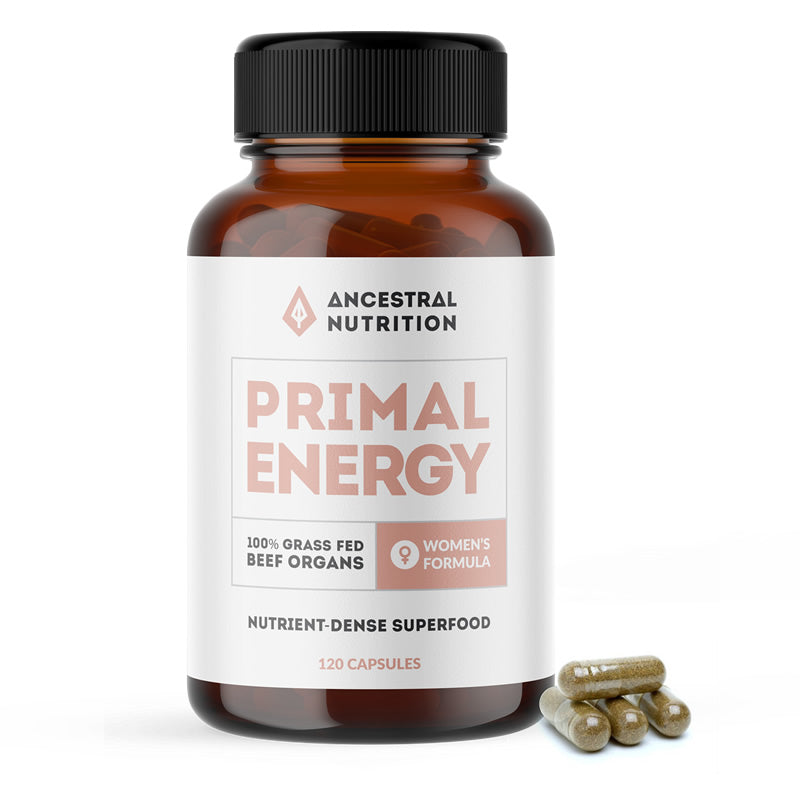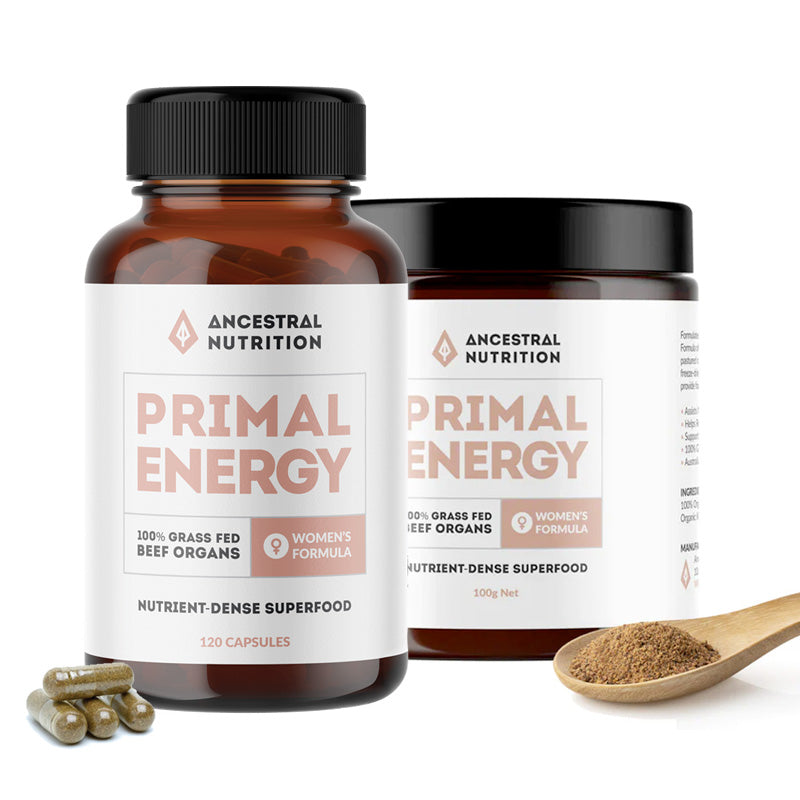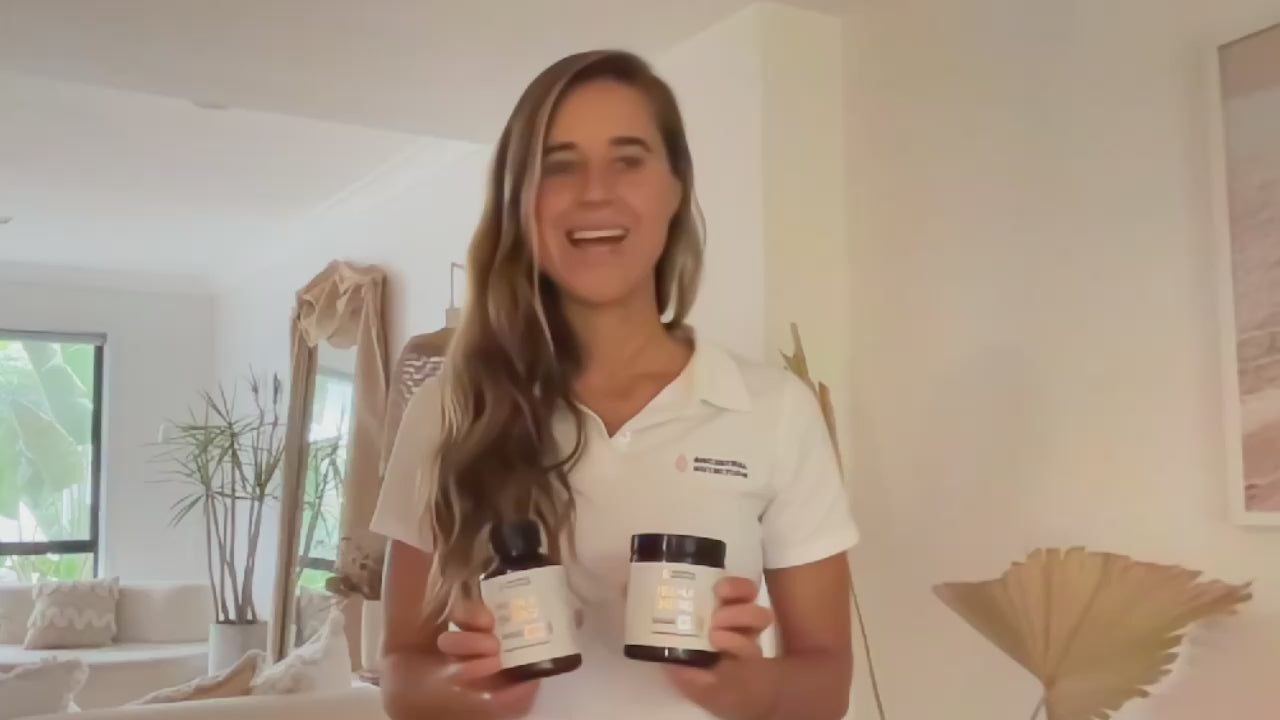FIGHT TIREDNESS NOW!
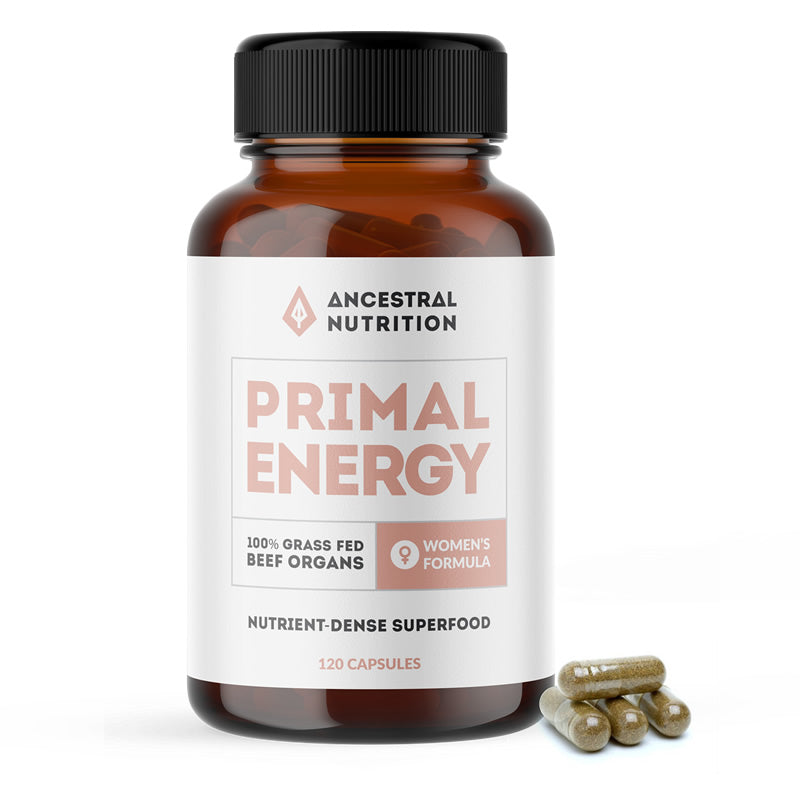
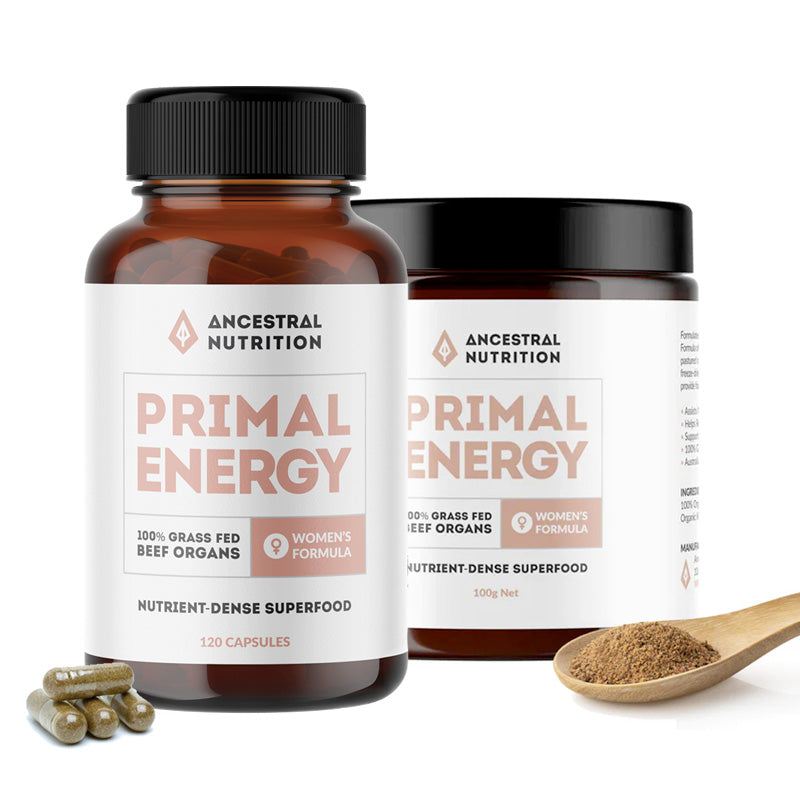








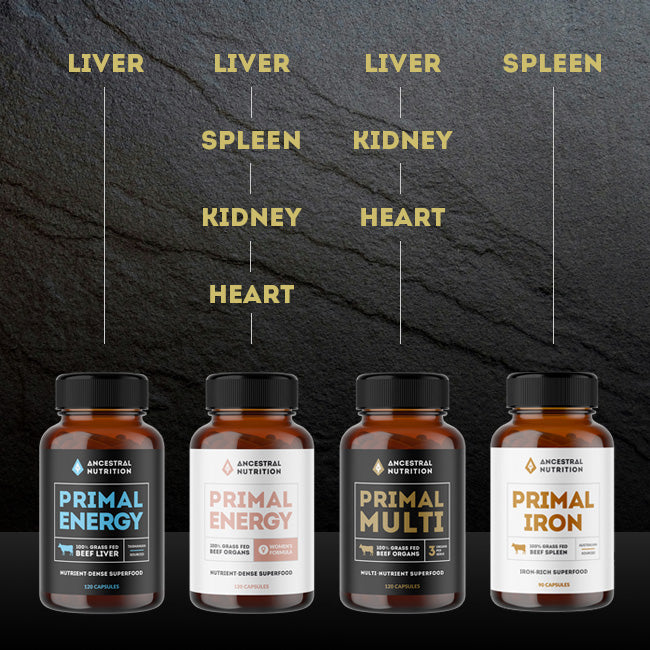
-

Helps Reduce Fatigue
Beef organs combat tiredness with natural vitamins and minerals fuelling your body for lasting energy.
-

Assists Iron Metabolism
Beef organs support optimal iron absorption and utilisation, helping maintain balanced energy levels.
-

Supports Hair, Skin & Nails
A natural source of vitamin A and essential nutrients, beef organs nourish and strengthen your hair, skin and nails.
What Are Women Saying About Primal Energy?
“I am so happy to have found your product”
“’I finally don’t feel tired all the time after taking primal energy. And you are an Australian Made brand. Ticks all the boxes for me.”
—Jules, NSW
“I no longer need an afternoon sleep”
“At 59, I always needed an afternoon sleep and went to bed early every night. Since taking your organ supplements I have all day energy and even went fishing the other night!”
—Anne, NSW
“Notable Difference”
"I started taking Liver capsules after I found my vitamin A was really low and the vitamin A supplement I was taking at that time obviously wasn't working. Well, firstly I feel great from taking the liver capsules (no stomach upset on my sensitive tummy). I also just recently retested and found that within just one month my vitamin A has gone up."
—Katie, NSW
“Great Product, Even My Teenagers Take Them!”
“I have searched for a product like this for a while now. I have just started my second bottle and I can really notice how much better I feel. I have more energy, I feel better, and they are so easy to take I can even get my teenagers to take them!!
—Amelia, NSW

Why People Use Beef Organs
- Assists Normal Iron Metabolism
- Helps Reduce Tiredness & Fatigue
- Supports Healthy Immune Function
- Hair, Skin & Eye Support
- Source of Natural Heme Iron
Real Reviews From Real People

Nutrient-Rich Support for Women
Each serve of our beef organ blend provides a wide range of essential nutrients naturally found in liver, spleen, kidney and heart — including vitamin A (as retinol), vitamin B12, folate, heme iron, riboflavin, copper, choline, and CoQ10. These wholefood nutrients play important roles in supporting energy, vitality, and overall wellbeing.

368% RDI Vitamin B12 per 3g Serve
Vitamin B12 Benefits:
- Helps Reduce Tiredness & Fatigue
- Assists Healthy Iron Metabolism
- Supports Normal Immune System Function

Grown in Tasmania. Crafted in Byron Bay.
We use certified grass-fed and grass-finished beef liver from Tasmanian farmers. It's freeze-dried in small batches and packed in our Byron Bay facility to retain its natural nutrient profile.
Third-party batch tested for quality.
Primal Energy Women's Formula Beef Organs FAQs
What Nutrients Are Naturally Found in Beef Organ Supplements?
Primal Energy Women: Nature’s All-in-One Organ Support
Crafted from four of nature’s most nutrient-rich organs — beef liver, spleen, heart, and kidney — this freeze-dried blend offers a powerful spectrum of essential nutrients to support your daily vitality. With no synthetic additives or fillers, just wholefood ingredients your body can recognise and absorb.
What You’ll Find in This Organ Blend:
- Heme Iron (from spleen & liver) – supports oxygen transport and contributes to normal energy production
- Vitamin B12 (from liver & kidney) – important for red blood cell formation and nervous system function
- CoQ10 (from heart) – naturally present and supports cellular energy metabolism
- Zinc, Copper & Selenium – essential trace minerals involved in immune function and antioxidant activity
- Peptides & Enzymes – including naturally occurring compounds unique to each organ
Sourced from 100% grass-fed, grass-finished Tasmanian cattle and gently freeze-dried to preserve nutritional integrity, this formula provides targeted, food-based nourishment in convenient capsules or powder—nothing synthetic, just real wholefood support.
How Do Beef Organ Supplements Taste?
Beef organ supplements are available in both capsule and powder form — and the taste experience can vary depending on which you choose.
- Capsules: Most people find beef organ capsules virtually tasteless. They’re an easy and convenient way to get the benefits of organ meats without the flavour. Simply swallow with water, just like any other supplement.
- Powder: Freeze-dried beef organ powder has a rich, earthy flavour that’s true to its natural source. While some people enjoy the taste in savoury blends, others prefer to mix it into smoothies, broths, or sauces to mask the flavour.
Whether you choose capsules or powder, beef spleen is valued more for its nutrient density than its taste. Tip: If you're sensitive to taste, capsules are the most neutral option.
When Is the Best Time to Take Beef Organ Supplements?
Beef organ supplements can be taken at any time of day, but many people prefer to take them in the morning or with their first meal to support daily nutrient intake and energy metabolism.
Because beef organs are naturally rich in vitamin B12, iron, and other energising nutrients, taking it earlier in the day may help align with your body’s natural rhythm and avoid any potential for overstimulation at night.
Tips for Best Results:
- With food: Taking beef organs with/after a meal may help improve absorption.
- Consistency matters: Regular daily use is more important than timing — choose a time that fits your routine.
- Start slow: If you're new to beef organs, begin with a smaller dose and gradually increase as tolerated.
Beef organ supplements are a wholefood source of nutrients, not synthetic isolates — making them suitable for long-term daily support.
How Long Does It Take to Notice the Effects of Beef Organ Supplements?
The timeline for noticing the benefits of beef organ supplements can vary from person to person. It often depends on your current iron and B12 status, dietary habits, and overall lifestyle.
Because beef organs are a natural source of heme iron, vitamin B12, and supportive trace minerals like zinc and copper, some individuals may feel a shift in energy, stamina, or general wellbeing within a few weeks. For others, it may take longer as the body gradually rebuilds nutrient stores.
Factors That May Influence Your Experience:
- Nutrient status: If you're not getting enough iron or B12 from food, you may notice changes sooner.
- Consistency: Whether you use capsules or powder, taking your supplement daily is key.
- Overall diet: Pairing beef organs with a nutrient-dense, wholefood diet may support better outcomes.
As with any wholefood supplement, beef organs work best when taken consistently over time as part of a balanced approach to wellbeing — not as a quick fix.
Are Your Beef Organ Products Free From Bovaer® Feed Additives?
Yes — our beef organ products are sourced from 100% grass-fed and grass-finished, pasture-raised Tasmanian cattle that are not supplemented with Bovaer® or other synthetic feed additives.
We work closely with local farms that focus on natural, traditional grazing practices. This ensures the purity of our products while maintaining full transparency across the supply chain — from paddock to capsule.
No hormones, no antibiotics, no synthetic feed additives — just real food the way nature intended.
Do You Sell Certified Organic Organs?
We often get this question — but the truth is, certified organic organs simply don’t meet our standards for nutritional density, animal welfare, or sustainability. Here’s why:
1. Animal Welfare:
Most Australian organic cattle are raised in arid central regions where only drought-tolerant breeds can survive. These harsh conditions often lead to stressed animals, which can negatively affect organ quality. In contrast, our cattle are raised on lush, rotational pastures in temperate climates.
2. Nutrient Quality:
Certified “Organic” doesn’t guarantee nutrient density. Many organic farms use broad-spectrum fertilisers without soil-specific analysis. We work with trained agronomists who test and manage soil health to maximise nutrient uptake in grasses — and ultimately in the organs.
3. Sustainability:
To meet organic certification, some producers use unsustainable inputs like prawn meal scraped from ocean floors — cheap, compliant, but ecologically harmful. Our approach focuses on true regenerative practices, not certification checkboxes.
We don’t chase labels. We chase results. Learn more on our quality page here.
Is Beef Spleen a Good Source of Iron?
Yes — beef spleen in particular is one of the richest natural sources of heme iron, the form most easily absorbed and used by the human body. A small daily serve provides meaningful amounts of iron to support your dietary intake through real, nutrient-dense food.
Iron contributes to:
- Normal energy production and reduction of tiredness and fatigue
- Healthy oxygen transport via red blood cells
- The formation of haemoglobin
- Normal immune system function
Because it comes in its heme form, the iron in beef spleen is significantly more bioavailable than the non-heme iron found in many plant-based foods.
Our beef organs are sourced from 100% grass-fed, grass-finished Australian cattle and gently freeze-dried to preserve its naturally occurring nutrients — with no additives or fillers.
Can I Use Beef Organ Supplements While Pregnant?
Beef organs are a natural source of important nutrients like heme iron, vitamin B12, zinc, and selenium — all of which play supportive roles during pregnancy. These nutrients are present in their wholefood form, making beef organs a valuable addition to a nutrient-dense diet for some women.
As always, we recommend consulting your healthcare provider before adding beef organ supplements to your routine during pregnancy, to ensure they align with your individual dietary needs and prenatal care plan.
Wholefood organ supplements like beef organs can offer nutritional value — but every pregnancy is different, and personalised advice is best.
How Are Your Beef Organ Supplements Made?
Our beef organ supplements are made using a careful, low-temperature freeze-drying process that preserves the natural integrity of the nutrients — without the use of heat, additives, or synthetic preservatives.
Here’s how we do it:
Step-by-Step Production Process:
- 1. Sourced Locally: We use 100% grass-fed & grass-finished, pasture-raised beef organs from Tasmanian farms that meet strict animal welfare and food safety standards.
- 2. Fresh Processing: The organs are trimmed, gently cleaned, and frozen shortly after harvest to maintain freshness and nutrient quality.
- 3. Freeze-Dried for Potency: Through sublimation, moisture is removed at low temperatures to preserve heat-sensitive vitamins like B12 and folate.
- 4. Milled and Encapsulated (or Powdered): The dried organs are finely ground and packed into capsules or jars — with no binders, fillers, or flow agents.
- 5. Packed in Our Byron Bay Facility: We manufacture in-house to maintain full control over quality and consistency, from raw ingredient to finished product.
Every batch is third-party tested for safety and packaged in our purpose-built Byron Bay facility — ensuring transparency, traceability, and trust.
What’s the Difference Between Beef Organ Capsules and Powder?
Both capsules and powder deliver the same core benefits of beef organs — but differ in format, convenience, and flexibility, depending on your lifestyle and preferences.
Beef Organ Capsules:
- Pre-measured and easy to take
- No taste or smell — ideal if you’re sensitive to flavour
- Great for travel or daily routines
- Offers consistent dosage (e.g. 2g = 4 capsules)
Beef Organ Powder:
- Versatile for adding to food (e.g. smoothies, bone broth, patties)
- Slightly more economical per gram
- Mild organ flavour — best for those who are comfortable with natural tastes
- Allows flexible dosing for families or pets
Whether you prefer convenience or culinary creativity, both formats provide the same freeze-dried, nutrient-dense organs — sourced from grass-fed & grass-finished Australian cattle and made without additives or fillers.
Disclaimer
The information presented on this page is provided for general educational purposes only and is not intended to diagnose, treat, cure, or prevent any disease. Statements about Primal Energy Women's Formula — Grass-Fed Beef Organs and other Ancestral Nutrition products have not been evaluated by the Therapeutic Goods Administration (TGA). These products are sold as foods/dietary supplements and are regulated under the Australia New Zealand Food Standards Code; they are not registered therapeutic goods.
Individual nutrient requirements vary. Always read the label, follow directions for use, and check the Nutrition Information Panel for serving size and daily intake guidance. If you are pregnant, nursing, under 18 years of age, have a known medical condition, or are taking prescription medication, consult a qualified healthcare professional before using any new food or supplement.
Testimonials and customer stories reflect personal experiences and may not be typical; results can differ from person to person. Ancestral Nutrition makes no guarantee of specific outcomes.
By continuing to browse or purchase from this site, you acknowledge that you have read and understood this disclaimer and agree to use the information and products responsibly and in conjunction with professional medical advice where appropriate.
Primal Energy Women's Formula Additional Information
Could This Be The Solution To Low Energy & Anemia?
Many of us consult Dr Google when wanting a solution to a problem with the search term ‘fatigue’ currently delivering 1.8 million results. It’s also reported that around 1.5 million Australians visit their doctor each year in the hope of fixing their fatigue.
So why are so many of us feeling sluggish? Are vitamins and minerals (or lack of) connected to fatigue and how can beef organs help? Before we share our findings let’s quickly touch on the two processes that are pivotal to experiencing optimal energy levels ...
1. ATP
In humans, the foods we eat provide the fuel required to perform our daily physical and mental activities. This food is broken down into sugars, fatty acids and amino acids that ultimately end up in our mitochondria (the batteries of our cells) which produce chemical energy called ATP (adenosine triphosphate). ATP is effectively a shuttle, delivering energy to places within the cell where energy-consuming activities are taking place.
Side note: A 2020 study published by PubMed* indicates a long-known involvement of vitamins and minerals in cellular energy production (ATP) which translates into perceived physical and mental fatigue.
2. Oxygen
While ATP's role in energy production is pivotal, other functions fulfilled by micronutrients are also key in relation to fatigue and cognition. Besides energy, muscles and brain also need oxygen, which should be delivered by the hemoglobin (which is a protein in red blood cells) that carries oxygen. This process requires the red blood cells to be created optimally in the first place for which (and this is important to note) ... iron, vitamin A and several B vitamins are critical. Inadequate intakes of these micronutrients result in anaemia, with resultant fatigue and weakness symptoms.
Side note: During anaemia when the levels of hemoglobin (the oxygen carrier) are decreased, oxygen delivery is impaired, with consequences for not only cognitive and physical performance, but also perceived fatigue and tiredness
So What Does This Mean?
It's now clear that select vitamins and minerals play a critical role in making healthy red blood cells for oxygen production while also producing ATP. It's also important to note that fatigue is much more than just a deficiency of iron. The vitamins and minerals that are central to supporting the two energy systems above are:
- B Vitamins (in particular B12)
- Vitamin A
- Vitamin C
- Iron
- Magnesium
- Zinc
The PubMed* study continues to outline that supplementing individuals with vitamins and minerals is thus highly likely to result in health benefits in the areas of mental and physical fatigue. Importantly, effective supplementation should carefully consider the chemical form of vitamins and minerals, that is natural versus synthetic, which can affect their bioavailability.
Could This Be Why Your Iron Supplement Is Ineffective?
As you can see, supplementing with more iron when you are anemic is only one piece of the puzzle. Without adequate intakes of the vitamins and minerals outlined above you may still be experiencing compromised energy production.
How Can Beef Liver & Organs Support Energy Production?
Many people assume that beef organs are simply a good source of iron which in turn helps to fight fatigue. Given what we now know about the two important processes involved in energy production and the nutrients required to support them, the picture starts to become clearer.
Beef liver and organs are particularly rich in vitamin A and B-vitamins, and are also rich in minerals, including iron, magnesium and zinc. These are the building blocks required to support optimal oxygen levels and ATP. They also come packed as nature intended in a whole food animal-based source that are generally more bioavailable than plant-based or synthetic supplements.
What if You Want More Energy But Don't Like Eating Beef Liver & Organs?
As you can see from the information above, adding beef liver and organ meats into your diet makes a lot of nutritional sense. If you’re still not comfortable with the idea of buying and preparing organ meats you're not alone. Fortunately there is an easy solution...
Our beef liver and beef organ supplements are contained in easy-to-take flavourless capsules. They are non-defatted to preserve the fat-soluble nutrient content (including vitamin A) and are freeze-dried, which also helps preserve the full range of nutrients. They are 100% hormone, antibiotic and GMO-free and are 100% grass-fed and organic from the pristine Tasmanian pastures.
Discover the Top 5 Nutrients for Improved Thyroid Function
Beef organs, particularly the kidney, have been gaining popularity in recent years due to their purported health benefits. Many people are turning to these nutrient-dense foods to support their overall health and wellbeing. One area where beef organs, specifically the kidney, may have a significant impact is on thyroid health.
The thyroid is a small gland located in the neck that plays a crucial role in regulating various bodily functions, including metabolism, energy production, and hormone balance. When the thyroid gland is not functioning correctly, it can lead to a variety of health issues, including weight gain, fatigue, hair loss, and more.
Research suggests that consuming beef organs, particularly the kidney, may be beneficial for thyroid health in both men and women. In this article, we will explore the various nutrients found in beef kidneys and how they can support thyroid function.
5 Nutrients that support thyroid health:
1. Iodine
One of the most crucial nutrients for thyroid health is iodine. Iodine is a mineral that is essential for the production of thyroid hormones. Without adequate iodine intake, the thyroid gland cannot produce enough hormones, which can lead to hypothyroidism.
Beef kidneys are an excellent source of iodine, which can support thyroid health and prevent iodine deficiency. Other good sources are seaweed, fish, dairy and eggs.
2. Selenium
Another important nutrient for thyroid health is selenium. Selenium is a mineral that plays a crucial role in the production of thyroid hormones. It also has antioxidant properties, which can protect the thyroid gland from damage.
Studies have shown that selenium deficiency can lead to thyroid dysfunction, including hypothyroidism and autoimmune thyroid disease. Eating foods rich in selenium, such as beef kidneys, brazil nuts, fish and meat can help support thyroid health and prevent these issues.
3. Vitamin B12
Vitamin B12 is a nutrient that is essential for the production of red blood cells and the maintenance of nerve function. It is also important for thyroid health.
Levels of vitamin B12 may be linked to an increased risk of thyroid dysfunction. Consuming foods rich in vitamin B12 like meat and organs, fish, poultry, eggs, and dairy products can help support thyroid health and prevent these issues.
4. Zinc
Zinc is a mineral that is essential for immune function, wound healing, and cell growth and division. It is also important for thyroid health.
Zinc deficiency may be linked to an increased risk of thyroid dysfunction. Consuming foods rich in zinc, such as beef organs, oysters, meat, fish and other seafoods can help support thyroid health and prevent these issues.
5. Iron
Iron is a mineral that is essential for the production of red blood cells and the transport of oxygen throughout the body. It is also important for thyroid health.
Research suggests that iron deficiency may be linked to an increased risk of thyroid dysfunction. Consuming foods rich in iron, such as beef organs, red meat, shellfish, nuts and seeds can help support thyroid health and prevent these issues.
Discover Organ Meats For Healthy Glowing Skin
Our skin is the largest and fastest growing organ and has one of the highest demands for nutrients. Skin conditions such as acne, psoriasis or premature ageing are all dependent on the nutrients contained in the foods we eat.
Researchers have noted connections between the skin, digestive system, and the brain and have termed this connection as the 'gut-brain-skin axis' and more recent research has validated strong associations between skin and common digestive/gut conditions. Does the term 'leaky gut' ring a bell?
If you want to take steps to address a particular skin condition or just want better looking skin, the foods we eat are a great starting point to support the skin-gut-brain axis. In this article we'll examine the key skin-specific nutrients found in organ meats and outline how they can help us achieve healthy, glowing skin ...
1. Vitamin A
Beef liver contains high levels of pre-formed vitamin A (also know as retinol) and is one of the most well recognised and easily absorbed nutrients for healthy skin. Synthetic retinoids have been commonly prescribed for the treatment of several skin conditions, including acne, eczema, and psoriasis since the 1980s.
Foods like carrots, sweet potatoes and pumpkin contain a 'precursor' form of vitamin A (called beta-carotene) which must be converted in the body to vitamin A. Some studies estimate that beta-carotene from plants has a conversion rate of as little as 3% to usable vitamin A. The best food sources of retinol are:
- Beef Liver and kidney
- Egg yolks
- Cod liver oil
- Grass-fed dairy
Skin Benefits: Eating foods that provide vitamin A in the pre-formed version (retinol) contributes to healthy skin by promoting skin cell growth and turnover. It helps fight acne by inhibiting oil secretion in the skin and decreasing androgen production.
2. Zinc
Zinc is one of the many essential nutrients that your body needs. This essential mineral supports healthy skin by promoting wound healing, fighting inflammation, and protecting our skin against UV radiation. Studies have found that zinc may be particularly beneficial for healing acne and other skin conditions like eczema.
Zinc can be found in a variety of animal and plant foods, but is best absorbed from animal products, including:
- Beef liver and kidney
- Red meat (beef & lamb)
- Oysters, scallops, shellfish
Plant-based sources of zinc like nuts, seeds, and beans are bound to phytates (the stored form of phosphorus found in seeds, nuts & legumes) which decrease their absorption in the body.
Skin Benefits: Due to its anti-inflammatory effects, zinc is especially beneficial for inflammatory acne and related scarring. Its anti-inflammatory properties may also help people with conditions such as rosacea and eczema.
3. Biotin
Biotin (or vitamin B7) is another well know nutrient for healthy skin. This water-soluble B-vitamin helps regulate fatty acid metabolism, which is critical for healthy skin.
Biotin deficiency leads to impaired fat production which tends to manifest in the skin first. Some common signs of biotin deficiency include hair loss and scaly, red, and inflamed skin around the mouth and other areas of the face and scalp. Biotin deficiency can also be a cause of dandruff for some people.
The best food sources of biotin are:
- Egg yolks
- Beef liver
- Almonds & walnuts
Skin Benefits: Biotin helps improve skin's hydration, smoothness, and appearance. Biotin is a versatile addition to your skincare routine.
Heme Iron vs. Synthetic Iron
Iron is probably the most common word used in the emails we receive. There's a lot of confusion in terms of wanting to access the most effective, absorbable form that doesn't come with a range of side effects, hence this article ...
Iron stands as one of the fundamental nutrients vital for various bodily functions, such as oxygen transport, energy production, and DNA synthesis. Its importance in maintaining overall health cannot be overstated. When discussing iron, two primary forms come into focus: heme iron and synthetic iron. Understanding their differences in bioavailability, potential side effects, and best sources is crucial for making informed dietary choices.
Heme Iron vs. Synthetic Iron: Unraveling the Distinctions
Bioavailability
Heme iron and synthetic iron exhibit differences in how effectively the body absorbs and utilises them. Heme iron, predominantly found in animal-based foods, boasts higher bioavailability compared to synthetic iron. Bioavailability refers to the amount of a nutrient that the body can absorb and use effectively.
The unique structure of heme iron found in hemoglobin and myoglobin in animal tissues allows for efficient absorption in the intestines. This characteristic absorption mechanism enables the body to utilise a more substantial portion of heme iron consumed compared to its synthetic counterpart.
Conversely, synthetic iron, often in the form of supplements or fortified foods, contains non-heme iron. This form of iron doesn't absorb as efficiently as heme iron. Factors such as the presence of inhibitors in certain foods and lower absorption rates contribute to the decreased bioavailability of synthetic iron.
Side Effects
Synthetic iron supplements can cause gastrointestinal discomfort, including nausea, and abdominal pain. One of the most common side effects of synthetic iron is constipation. Iron supplements can slow down bowel movements and cause stools to become hard and difficult to pass.
The form in which synthetic iron is presented in supplements can be harsh on the digestive system. Some forms of iron, such as ferrous sulfate or ferrous fumarate, can irritate the stomach lining, causing discomfort, nausea, or even gastritis.
Heme iron, found in animal-based foods, has fewer side effects due to better absorption and its natural form, minimising gastrointestinal issues.
Optimal Sources of Heme Iron
When it comes to obtaining iron from dietary sources, heme iron predominantly comes from animal-derived foods, such as red meat, poultry, and fish. Beef, in particular, stands out as a significant source of heme iron, with the lesser-known beef spleen containing exceptionally high iron content. Learn more about iron rich foods here.
Best Food Sources of Heme Iron
- Red Meat: Beef, lamb, and pork contain substantial amounts of heme iron. These cuts of these meats provide a nutrient-dense source of iron.
- Poultry: Chicken and turkey serve as good sources of heme iron.
- Fish: Certain types of fish, such as salmon and tuna, offer heme iron along with popular omega-3 fatty acids.
- Beef Spleen: While less commonly consumed, the beef spleen presents the richest source of heme iron in the beef organs space.
Conclusion
Heme iron and synthetic iron differ significantly in their bioavailability, potential side effects, and dietary sources. While heme iron, predominantly found in animal-based foods, boasts higher bioavailability, synthetic iron, often in supplements or fortified foods, offers an alternative for individuals with specific dietary needs.
Understanding these differences enables individuals to make informed choices about their iron intake. Incorporating a balanced diet with various heme iron sources, including the often-overlooked beef spleen, can contribute significantly to meeting daily iron requirements without solely relying on synthetic supplements.

